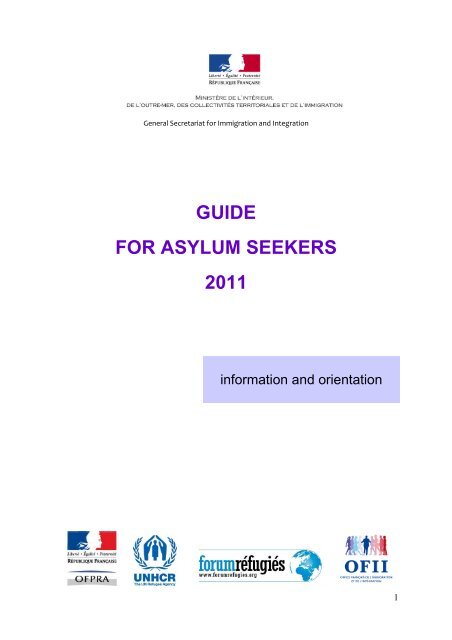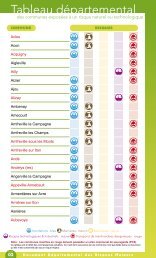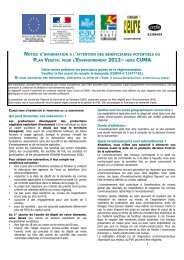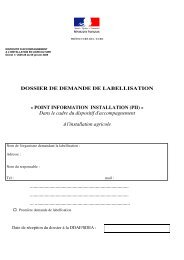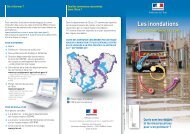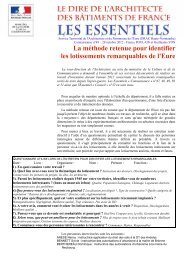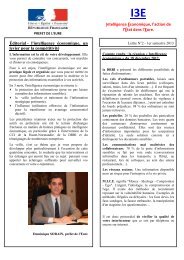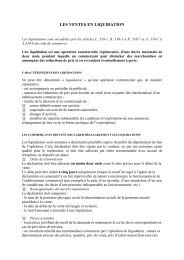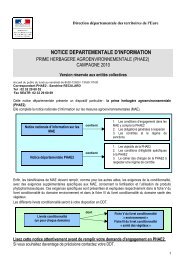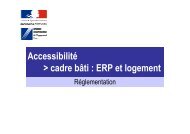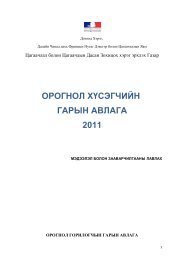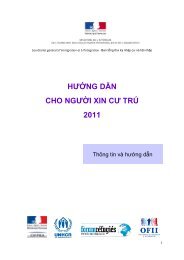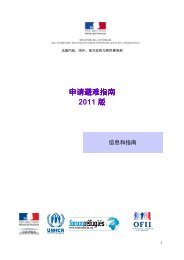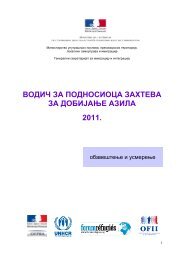Guide DA Anglais - Ministère de l'Intérieur
Guide DA Anglais - Ministère de l'Intérieur
Guide DA Anglais - Ministère de l'Intérieur
Create successful ePaper yourself
Turn your PDF publications into a flip-book with our unique Google optimized e-Paper software.
General Secretariat for Immigration and Integration<br />
GUIDE<br />
FOR ASYLUM SEEKERS<br />
2011<br />
information and orientation<br />
1
CONTENTS<br />
1 – THE VARIOUS FORMS OF PROTECTION .................................................................... 3<br />
1.1 – REFUGEE STATUS 3<br />
1.2 – SUBSIDIARY PROTECTION 3<br />
1.3 – STATELESS PERSON STATUS 4<br />
2 – RESIDENCE DURING THE ASYLUM PROCEDURE ..................................................... 5<br />
2.1 – DOCUMENTATION REQUIRED 7<br />
2.2 – DECIDING ON THE STATE RESPONSIBLE FOR CONSIDERING YOUR<br />
APPLICATION 8<br />
2.3 – ASYLUM-SEEKER’S TEMPORARY RESIDENCE PERMIT – ISSUED OR<br />
REFUSED 9<br />
3 – HOW AN ASYLUM APPLICATION IS CONSIDERED....................................................11<br />
(THE DIFFERENT BODIES CONCERNED).........................................................................11<br />
3.1 – FRENCH OFFICE FOR THE PROTECTION OF REFUGEES AND STATELESS<br />
PERSONS (OFPRA) 11<br />
3.2 – NATIONAL ASYLUM COURT (CN<strong>DA</strong>) 14<br />
3.3 – REJECTION OF AN ASYLUM APPLICATION 18<br />
4 – RE-CONSIDERATION ...................................................................................................20<br />
5 – STATELESS PERSON STATUS....................................................................................21<br />
6 – HELP AVAILABLE TO ASYLUM SEEKERS...................................................................22<br />
6.1 – ACCOMMO<strong>DA</strong>TION 22<br />
6.2 – FINANCIAL ASSISTANCE – TEMPORARY WAITING ALLOWANCE (ATA) 23<br />
6.3 – ACCESS TO HEALTH CARE 24<br />
7 – THE RIGHTS OF REFUGEES IN FRANCE ...................................................................26<br />
7.1 – PROTECTION IN FRANCE 26<br />
7.2 – RESIDENCE IN FRANCE 26<br />
7.3 – TRAVELLING ABROAD 27<br />
7.4 – RESIDENCE AND PROTECTION OF CLOSE FAMILY 27<br />
7.5 – WELCOME AND INTEGRATION CONTRACT 28<br />
7.6 – HEALTH CARE 30<br />
7.7 – WELFARE AND FAMILY BENEFITS 30<br />
7.8 – NATURALISATION 30<br />
8 – ASSISTANCE FOR VOLUNTARY RETURN TO THE COUNTRY OF ORIGIN ..............31<br />
8.1 – REPATRIATION GRANT 31<br />
8.2 – ASSISTANCE FOR REINSERTION IN THE COUNTRY OF ORIGIN 31<br />
9 - FLOWCHART OF ASYLUM AND RESIDENCE APPLICATION PROCEDURES............32<br />
10 – USEFUL ADDRESSES ...............................................................................................33<br />
10.1 – NATIONAL ADDRESSES 33<br />
10.2 – DEPARTMENTAL ADDRESSES 36<br />
2
1 – THE VARIOUS FORMS OF PROTECTION<br />
In France, there are 3 forms of protection: refugee status, subsidiary protection and<br />
stateless person status.<br />
1.1 – REFUGEE STATUS<br />
Refugee status can be granted on one of the 3 following grounds:<br />
- The Geneva Convention dated 28 July 1951 on the status of refugees: refugee<br />
status is granted to "any person who [...] owing to well-foun<strong>de</strong>d fear of being<br />
persecuted for reasons of race, religion, nationality, membership of a particular social<br />
group or political opinion, is outsi<strong>de</strong> the country of his nationality and is unable, or<br />
owing to such fear, is unwilling to avail himself or herself of the protection of that<br />
country";<br />
- The asylum generally referred to as constitutional asylum, relying on the fourth<br />
paragraph of the Preamble of the 1946 Constitution: refugee status is granted to<br />
"whoever is persecuted for his or her activities in pursuit of freedom";<br />
- The mandate of the United Nations High Commission for Refugees (UNHCR):<br />
if you have refugee status granted by the UNHCR on the basis of Articles 6 and 7 of<br />
its Statute.<br />
1.2 – SUBSIDIARY PROTECTION<br />
Subsidiary protection is granted to "any person who does not meet the requirements<br />
laid down for refugee status [...] and who has established that he or she is exposed<br />
to one of the following serious threats in his or her country of origin:<br />
a) the <strong>de</strong>ath penalty;<br />
b) torture, inhuman or <strong>de</strong>grading treatment;<br />
c) for a civilian, a direct and individual serious threat against his or her life or<br />
well-being owing to generalised violence resulting from an internal or<br />
international armed conflict".<br />
The French Office for the Protection of Refugees and Stateless Persons (Office<br />
français <strong>de</strong> protection <strong>de</strong>s réfugiés et apatri<strong>de</strong>s - OFPRA) can refuse to renew<br />
subsidiary protection if the grounds on which it was granted no longer exist.<br />
In France, refugee status and subsidiary protection are granted by the French Office<br />
for the Protection of Refugees and Stateless Persons (OFPRA), un<strong>de</strong>r the judicial<br />
control of the National Asylum Court (Cour nationale <strong>de</strong> droit d’asile – CN<strong>DA</strong>).<br />
3
1.3 – STATELESS PERSON STATUS<br />
According to the New York Convention dated 28 September 1954 on the status of<br />
stateless persons, this status can be granted to any person “who is not consi<strong>de</strong>red as<br />
a national by any State un<strong>de</strong>r the operation of its law”. This status is different from<br />
the other two forms of protection and only concerns persons who have no nationality.<br />
It does not take risks of persecution into account. An application for this status can be<br />
ma<strong>de</strong> at the same time as for asylum.<br />
Stateless person status is granted by the French Office for the Protection of<br />
Refugees and Stateless Persons (OFPRA), un<strong>de</strong>r the control of the administrative<br />
court.<br />
4
2 – RESIDENCE DURING THE ASYLUM PROCEDURE<br />
In or<strong>de</strong>r to apply for asylum, you must first go to the prefecture and apply for an<br />
asylum-seeker's resi<strong>de</strong>nce permit. This action is compulsory for all persons aged 14<br />
years or ol<strong>de</strong>r. You must go to the prefecture promptly. If you have a visa, you are<br />
advised to go to the prefecture before it expires.<br />
The prefecture where you should apply for an asylum-seeker’s resi<strong>de</strong>nce permit is,<br />
generally speaking, the <strong>de</strong>partmental prefecture in the capital of the region where<br />
you are.<br />
ALSACE<br />
- Bas-Rhin<br />
- Haut-Rhin<br />
Region/<strong>de</strong>partment<br />
where you are staying<br />
AQUITAINE<br />
Giron<strong>de</strong>, Dordogne, Lan<strong>de</strong>s, Lot-et-<br />
Garonne and Pyrénées-Atlantiques<br />
AUVERGNE<br />
Puy-<strong>de</strong>-Dome, Allier, Cantal and Haute-<br />
Loire<br />
BURGUNDY<br />
Côte d’Or, Nièvre, Saône-et-Loire and<br />
Yonne<br />
BRITTANY<br />
Ille-et-Vilaine, Côtes d'Armor, Finistère<br />
and Morbihan<br />
CENTRE<br />
Cher, Eure-et-Loir, Loir-et-Cher<br />
and Loiret<br />
CHAMPAGNE-ARDENNE<br />
Marne, Ar<strong>de</strong>nnes, Aube and Haute-<br />
Marne<br />
CORSICA<br />
- Corse-du-Sud<br />
- Haute-Corse<br />
FRANCHE-COMTÉ<br />
Doubs, Jura, Haute-Saône and the<br />
Belfort Territory<br />
LANGUEDOC-ROUSSILLON<br />
Au<strong>de</strong>, Gard, Hérault, Lozère and<br />
Pyrénées-Orientales<br />
ÎLE-DE-FRANCE<br />
- Paris<br />
- Seine-et-Marne<br />
- Yvelines<br />
Prefecture<br />
where you should apply for an<br />
asylum-seeker’s resi<strong>de</strong>nce permit<br />
- Bas-Rhin (Strasbourg)<br />
- Haut-Rhin (Colmar)<br />
Giron<strong>de</strong> ( Bor<strong>de</strong>aux)<br />
Puy-<strong>de</strong>-Dome (Clermont-Ferrand)<br />
Côte d’Or (Dijon)<br />
Ille-et-Vilaine (Rennes)<br />
Loiret (Orléans)<br />
Marne (Châlons-en-Champagne)<br />
- Corse-du-Sud (Ajaccio)<br />
- Haute Corse (Bastia)<br />
Doubs (Besançon)<br />
Hérault (Montpelier)<br />
- Paris Police Prefecture<br />
- Seine-et-Marne (Melun)<br />
- Yvelines (Versailles)<br />
5
- Essonne<br />
- Hauts-<strong>de</strong>-Seine<br />
- Seine-Saint-Denis<br />
- Val-<strong>de</strong>-Marne<br />
Val-d’Oise<br />
LANGUEDOC-ROUSSILLON<br />
Au<strong>de</strong>, Gard, Hérault, Lozère and<br />
Pyrénées-Orientales<br />
LIMOUSIN<br />
Haute-Vienne, Corrèze and Creuse<br />
LORRAINE<br />
Moselle, Meurthe-et-Moselle, Meuse and<br />
Vosges<br />
MIDI-PYRÉNNÉES<br />
- Ariège, Gers, Haute-Garonne and<br />
Hautes-Pyrénées<br />
- Aveyron, Lot, Tarn and Tarn-et-<br />
Garonne<br />
NORD-PAS-DE-CALAIS<br />
Nord and Pas-<strong>de</strong>-Calais<br />
BASSE-NORMANDIE<br />
Calvados, Manche and Orne<br />
HAUTE-NORMANDIE<br />
Seine-Maritime and Eure<br />
PAYS-DE-LA-LOIRE<br />
Loire-Atlantique, Maine-et-Loire,<br />
Mayenne, Sarthe and Vendée<br />
PICARDY<br />
Somme, Aisne and Oise<br />
POITOU-CHARENTES<br />
Vienne, Charente, Charente-Maritime<br />
and Deux-Sèvres<br />
PROVENCE-ALPES-CÔTE-D'AZUR<br />
- Alpes-<strong>de</strong>-Haute-Provence, Bouchesdu-Rhône,<br />
Hautes-Alpes and Vaucluse<br />
- Alpes-Maritimes and Var<br />
RHÔNE-ALPES<br />
- Ardèche, Ain, Loire and Rhône<br />
- Drôme, Isère, Haute-Savoie and Savoie<br />
- Essonne (Evry)<br />
- Hauts-<strong>de</strong>-Seine (Nanterre)<br />
- Seine-Saint-Denis (Bobigny)<br />
- Val-<strong>de</strong>-Marne (Créteil)<br />
Val-d’Oise (Cergy-Pontoise)<br />
Hérault (Montpelier)<br />
Haute-Vienne (Limoges)<br />
Moselle (Metz)<br />
- Haute-Garonne (Toulouse)<br />
- Tarn-et-Garonne (Montauban)<br />
Nord (Lille)<br />
Calvados (Caen)<br />
Seine-Maritime (Rouen)<br />
Loire-Atlantique (Nantes)<br />
Oise (Beauvais)<br />
Vienne (Poitiers)<br />
- Bouches-du-Rhône (Marseille)<br />
- Alpes-Maritimes (Nice)<br />
- Rhône (Lyon)<br />
- Isère (Grenoble)<br />
Gua<strong>de</strong>loupe Gua<strong>de</strong>loupe (Basse-Terre)<br />
Martinique Martinique (Fort <strong>de</strong> France)<br />
French Guiana French Guiana (Cayenne)<br />
La Réunion La Réunion (Saint-Denis)<br />
Mayotte Mayotte (Dzaoudzi)<br />
Saint-Pierre et Miquelon Saint-Pierre et Miquelon (Saint-Pierre)<br />
French Polynesia French Polynesia (Papeete)<br />
New Caledonia New Caledonia (Nouméa)<br />
Wallis-et-Futuna Wallis-et-Futuna (Mata-Utu)<br />
6
You may apply for asylum even if you entered France illegally or if you are an illegal<br />
alien on French territory.<br />
If you apply for stateless person and refugee status at the same time, you must go to<br />
the prefecture so that first of all a <strong>de</strong>cision can be ma<strong>de</strong> on your application for an<br />
asylum-seeker’s resi<strong>de</strong>nce permit.<br />
However, if you only apply for stateless person status, a temporary resi<strong>de</strong>nce permit<br />
(autorisation provisoire <strong>de</strong> séjour, APS) will not be issued while your application is<br />
being consi<strong>de</strong>red. In this case, you must go directly to the French Office for the<br />
Protection of Refugees and Stateless Persons (Office français <strong>de</strong> protection <strong>de</strong>s<br />
réfugiés et apatri<strong>de</strong>s - OFPRA) without going to the prefecture.<br />
2.1 – DOCUMENTATION REQUIRED<br />
To receive an asylum-seeker’s resi<strong>de</strong>nce permit, you must submit an application<br />
together with a certain number of documents. You can obtain the list of the<br />
documents required at the prefecture. These are:<br />
1. an asylum-seeker’s resi<strong>de</strong>nce permit application form (available in 18<br />
languages). This form must be completed in French;<br />
2. four i<strong>de</strong>ntity photos, front view, barehea<strong>de</strong>d, in 3.5 cm x 4.5 cm format, recent<br />
and a very good likeness;<br />
3. information on your name, filiation and marital status and, if appropriate, that<br />
of your spouse and your <strong>de</strong>pen<strong>de</strong>nt children;<br />
4. documents or information about the conditions un<strong>de</strong>r which you entered<br />
France and your itinerary since you left your country of origin.<br />
You may apply for asylum even if you do not have a passport, visa or i<strong>de</strong>ntity<br />
documents. In this case you will have to make a written <strong>de</strong>claration of your name,<br />
filiation and marital status.<br />
5. documentary proof of the address where you are living. The prefecture needs<br />
your address to send you correspon<strong>de</strong>nce regarding your resi<strong>de</strong>nce in<br />
France. If you do not have fixed accommodation, you can use an address<br />
belonging to a private person, a hotel or an association approved by the<br />
prefecture.<br />
In all cases, the address you give must be in the <strong>de</strong>partment or the region where you<br />
are making your application for asylum.<br />
If you move to a new address at any time during the asylum procedure, you will have<br />
to inform the prefecture and also the OFPRA or the CN<strong>DA</strong>.<br />
7
2.2 – DECIDING ON THE STATE RESPONSIBLE FOR CONSIDERING YOUR<br />
APPLICATION<br />
When you hand over your application, the prefecture will take your fingerprints to<br />
<strong>de</strong>termine if France is the European Union state responsible for consi<strong>de</strong>ring your<br />
asylum application un<strong>de</strong>r the regulation of the Council of the European Union dated<br />
18 February 2003, called the Dublin II Regulation.<br />
The States concerned by the Dublin II Regulation<br />
The 26 other Member States of the European Union:<br />
Austria, Belgium, Bulgaria, Cyprus, Czech Republic, Denmark,* Estonia, Finland,<br />
Germany, Greece, Hungary, Ireland, Italy, Latvia, Lithuania, Luxembourg, Malta, the<br />
Netherlands, Poland, Portugal, Romania, Slovakia, Slovenia, Spain, Swe<strong>de</strong>n and the<br />
United Kingdom and also Switzerland, Iceland and Norway.<br />
* Denmark is not subject to the Dublin II Regulations, but continues to apply the Dublin Convention, signed on 15 June<br />
1990.<br />
In fact, it is possible that another European state and not France is responsible for<br />
consi<strong>de</strong>ring your application for asylum, for instance:<br />
- if you have already applied for asylum in another Member State;<br />
- if you entered the European Union by initially crossing the bor<strong>de</strong>rs of a Member<br />
State for which you do not need a visa;<br />
- if it is established that you crossed the external bor<strong>de</strong>r of another Member State<br />
illegally, by land, air or sea;<br />
- if another Member State has issued you with a resi<strong>de</strong>nce permit or a visa that is<br />
still valid.<br />
The processing of your asylum application by another Member State: if a Member<br />
State other than France is responsible for consi<strong>de</strong>ring your asylum application, the<br />
prefecture will then approach that State to ask it to process your application. The<br />
prefecture will give you a document which will allow you to remain in France while<br />
waiting for a response from that State.<br />
If that State agrees to process your application, the prefecture may either leave you<br />
to make your own way there, or have you escorted by the police.<br />
If the other State justifies its <strong>de</strong>finitive refusal to process your application or if France<br />
is responsible for consi<strong>de</strong>ring your asylum application, the procedure will continue as<br />
<strong>de</strong>scribed below.<br />
8
2.3 – ASYLUM-SEEKER’S TEMPORARY RESIDENCE PERMIT – ISSUED OR<br />
REFUSED<br />
Once your application for asylum has been submitted, it will be consi<strong>de</strong>red by<br />
OFPRA in all cases. Depending on your situation, it will be consi<strong>de</strong>red either un<strong>de</strong>r<br />
normal procedure once the prefecture has issued you a temporary resi<strong>de</strong>nce permit<br />
(APS), or un<strong>de</strong>r priority procedure if the prefecture has not issued you a temporary<br />
resi<strong>de</strong>nce permit (APS).<br />
2.3.1 – The normal procedure<br />
Un<strong>de</strong>r this procedure, the prefecture will give you:<br />
1. an asylum application form that you must complete and send or hand in to<br />
OFPRA, no later than 21 days after the temporary resi<strong>de</strong>nce permit (APS)<br />
was issued. For example, if your temporary resi<strong>de</strong>nce permit was issued on<br />
10 January, you have to have han<strong>de</strong>d in or sent your application to OFPRA on<br />
or before 31 January;<br />
2. a temporary resi<strong>de</strong>nce permit (APS) bearing the mention « En vue <strong>de</strong><br />
démarche auprès <strong>de</strong> l’OFPRA » « For the purpose of application to<br />
OFPRA », valid for 1 month. This temporary resi<strong>de</strong>nce permit (APS) is<br />
issued to you within 15 days after you hand in to the prefecture your<br />
completed application form for a temporary resi<strong>de</strong>nce permit with all the<br />
documentation required (see point 2.1, page 7).<br />
When the temporary resi<strong>de</strong>nce permit (APS) expires, you will have to give the<br />
prefecture the letter from the OFPRA that acknowledges the receipt of your asylum<br />
application. If you do not do so, the prefecture may refuse to re-issue a temporary<br />
resi<strong>de</strong>nce permit.<br />
As soon as you receive the OFPRA acknowledgement letter with your reference<br />
number, you should go to the prefecture with this document and new documentary<br />
evi<strong>de</strong>nce of your address. Within three days after your temporary resi<strong>de</strong>nce permit<br />
(APS) expires, the prefecture gives you an "acknowledgement recording the filing<br />
of an asylum application" = your 3-month asylum-seeker’s application<br />
acknowledgement (récépissé). This is valid for 3 months. It is renewable throughout<br />
the asylum procedure period. At the first renewal of this acknowledgement (récépissé<br />
<strong>de</strong> 3 mois), and on each subsequent renewal, you will have to provi<strong>de</strong> documentary<br />
proof of the address where you are living. A postal address that does not<br />
correspond to the place where you are living is normally not acceptable, except in<br />
cases of extreme precariousness.<br />
The acknowledgement does not allow you to work without authorisation.<br />
9
2.3.2 – The priority procedure<br />
The prefecture can refuse to issue you a temporary resi<strong>de</strong>nce permit (APS) and<br />
send your application to OFPRA via the priority procedure.<br />
It takes such a <strong>de</strong>cision when:<br />
1. You are a national of:<br />
- a Member State of the European Union;<br />
- a country for which OFPRA <strong>de</strong>ems that, in general, there is no longer any risk<br />
of persecution (Chile);<br />
- a country on the list of "safe countries of origin". At the time of writing, the<br />
following countries are on this list: Albania, Benin, Bosnia-Herzegovina, Cap<br />
Ver<strong>de</strong>, Croatia, Ghana, India, Kosovo, Mali (as regards men only), the former<br />
Yugoslavian Republic of Macedonia (FYRM), Mauritius, Mongolia, Senegal,<br />
Serbia, Tanzania and Ukraine;<br />
2. your presence in France constitutes a serious threat to public or<strong>de</strong>r, public safety<br />
or State security;<br />
3. Your application is thought to be <strong>de</strong>liberately fraudulent or is an improper use of<br />
asylum procedures (e.g., if you have submitted several asylum applications un<strong>de</strong>r<br />
different i<strong>de</strong>ntities or if you applied for asylum when you were notified of a<br />
removal or<strong>de</strong>r or when you were arrested even though you had been in France for<br />
some time).<br />
If you are in one of these situations, the prefecture will give you a <strong>de</strong>cision in writing<br />
stating the grounds on which the temporary resi<strong>de</strong>nce permit (APS) has not been<br />
issued and will return your asylum application form.<br />
In fact, the refusal to issue you a temporary resi<strong>de</strong>nce permit (APS) for the reasons<br />
given above does not prevent you from applying to OFPRA through the intermediary<br />
of the prefecture.<br />
OFPRA will <strong>de</strong>ci<strong>de</strong> within 15 days.<br />
10
3 – HOW AN ASYLUM APPLICATION IS CONSIDERED<br />
(THE DIFFERENT BODIES CONCERNED)<br />
The prefecture has just given you the asylum application form.<br />
When you file your asylum application, you do not need to specify the type of<br />
protection you would like to obtain (refugee status or subsidiary protection).<br />
Asylum application is a single procedure: your application will be consi<strong>de</strong>red first of<br />
all by the OFPRA from the standpoint of refugee status then, if your situation does<br />
not entitle you to the refugee status, from the standpoint of subsidiary protection.<br />
If OFPRA refuses to grant you neither refugee status nor the benefit of subsidiary<br />
protection, you can lodge an appeal at the National Asylum Court (CN<strong>DA</strong>). Similarly,<br />
you can lodge an appeal at the CN<strong>DA</strong> if you wish to contest OFPRA’s <strong>de</strong>cision to<br />
grant you subsidiary protection.<br />
The information contained in your asylum application is confi<strong>de</strong>ntial. Un<strong>de</strong>r no<br />
circumstances will it be communicated to the authorities of your country.<br />
3.1 – FRENCH OFFICE FOR THE PROTECTION OF REFUGEES AND<br />
STATELESS PERSONS (OFPRA)<br />
To fill in the OFPRA form<br />
- You must sign and date your application. If you do not do so, OFPRA cannot<br />
register it. (For a minor, the legal representative must sign it.)<br />
- The application must be written in French.<br />
- Your address must be easily readable.<br />
You must fill in all the sections in the OFPRA form, making sure that you:<br />
- give exact <strong>de</strong>tails of your personal and family situation;<br />
- <strong>de</strong>scribe all the personal reasons that led you to flee your own country<br />
and the reasons why you cannot return there;<br />
- pay attention to the chronological or<strong>de</strong>r and ensure the facts are logical;<br />
- give dates, places and the names of persons.<br />
-You may enclose with the application any element you feel would be useful when<br />
your application is consi<strong>de</strong>red. If you have any special requests with regard to your<br />
hearing, you can point them out to OFPRA.<br />
11
Documents required by OFPRA<br />
You must submit:<br />
- a photocopy of your valid temporary resi<strong>de</strong>nce permit (APS) issued by the<br />
prefecture;<br />
-2 recent i<strong>de</strong>ntity photos<br />
And provi<strong>de</strong>d you have the following in your possession, you must also submit:<br />
- the originals of your i<strong>de</strong>ntity papers (passport, national i<strong>de</strong>ntity card, birth<br />
certificate …);<br />
- documents to support your account.<br />
Filing your application<br />
- If your application is processed un<strong>de</strong>r normal procedure:<br />
It is essential to send your complete application to the address below at the latest<br />
on the 21st day after your temporary resi<strong>de</strong>nce permit (APS) was issued:<br />
Office française <strong>de</strong> protection <strong>de</strong>s réfugiés et apatri<strong>de</strong>s (OFPRA)<br />
201, rue Carnot<br />
94136 Fontenay-sous-Bois CEDEX<br />
If you <strong>de</strong>lay beyond the 21-day time limit or if your application is incomplete,<br />
your application will not be registered by OFPRA. You are advised to send your<br />
application by “registered letter with acknowledgement of receipt” (recommandé avec<br />
accuse <strong>de</strong> reception), and to make sure that your name is written clearly in the<br />
section “sen<strong>de</strong>r” (expéditeur).<br />
You can also hand in your application at the reception <strong>de</strong>sk of OFPRA (same<br />
address) from Monday to Friday, between 9 a.m. and 3 p.m.<br />
- If your application is processed un<strong>de</strong>r priority procedure:<br />
You must hand in your completed and signed asylum application at the prefecture<br />
within 15 days, in a sealed envelope. The prefecture must not know the contents of<br />
your asylum application. They are confi<strong>de</strong>ntial. When the prefecture receives the<br />
asylum application, it will be sent to OFPRA, for the priority procedure.<br />
Whatever your situation, keep the proofs of posting and acknowledgements of your<br />
correspon<strong>de</strong>nce carefully. If possible, keep photocopies of your complete application<br />
(including the OFPRA form) and all the documents you send to OFPRA.<br />
At any point of the procedure, you may send OFPRA additional elements for your<br />
dossier. On every letter you send to OFPRA do not forget to quote your registration<br />
number. You will find it on the letter from OFPRA acknowledging the registration of<br />
your asylum application.<br />
12
Proof of registration<br />
If your application is complete and received within the time limit, OFPRA will send<br />
you a letter informing you that your application has been registered and giving you<br />
your application registration number. This document officially certifies the registration<br />
of your asylum application. Normally, you should receive this letter before your onemonth<br />
temporary resi<strong>de</strong>nce permit (APS) expires. However, it is important to keep<br />
with you all proofs of having sent your application so that, if required, you can show<br />
them to the prefecture when your temporary resi<strong>de</strong>nce permit (APS) expires.<br />
If your application is incomplete when it reaches OFPRA before the 21-day <strong>de</strong>adline<br />
has expired, OFPRA will return it to you requesting additional information or items.<br />
You must send it back or hand it in to OFPRA as soon as possible with the items<br />
requested in or<strong>de</strong>r not to exceed the 21-day <strong>de</strong>adline. If you fail to provi<strong>de</strong> the extra<br />
elements within the <strong>de</strong>adline, OFPRA will not register your application and your<br />
temporary resi<strong>de</strong>nce permit (APS) will not be renewed.<br />
The interview at OFPRA<br />
OFPRA issues a notice for an interview unless:<br />
1. The documents supporting your application are sufficient for OFPRA to<br />
grant you asylum;<br />
2. You are a national of a country for which OFPRA consi<strong>de</strong>rs, generally<br />
speaking, there is no longer any risk of persecution;<br />
3. Your application is manifestly unfoun<strong>de</strong>d; in other words, the grounds you<br />
have put forward bear no relation to the criteria stipulated by the laws on<br />
asylum.<br />
4. Medical reasons prevent you from attending the interview.<br />
If you receive a notice for an interview, you must go to OFPRA head office. You will<br />
be interviewed by an OFPRA official, called a "protection officer". OFPRA will provi<strong>de</strong><br />
an interpreter for the language that you stated you speak in your asylum application<br />
form, or which it is reasonable to think that you speak. The interview is confi<strong>de</strong>ntial.<br />
The protection officer records your statements in a report.<br />
There is an OFPRA branch office at Basse-Terre (Gua<strong>de</strong>loupe) which has jurisdiction<br />
to <strong>de</strong>al with asylum applications submitted in the three <strong>de</strong>partments of that region:<br />
Gua<strong>de</strong>loupe, Martinique and French Guiana. If you have han<strong>de</strong>d in your application<br />
in one of these three <strong>de</strong>partments, you will be called for an interview at Basse-Terre<br />
and not in Fontenay-sous-Bois.<br />
If you do not attend this interview, your absence will have unfavourable<br />
consequences on your asylum application. It is therefore essential that you inform<br />
OFPRA at least 48 hours beforehand if you are unable to attend or if you are going to<br />
be late.<br />
13
If you have changed your address, it is also essential that you inform OFPRA in<br />
writing as soon as possible, preferably by registered letter with acknowledgement of<br />
receipt. In fact, OFPRA will inform you of its <strong>de</strong>cision by letter to the last address that<br />
you provi<strong>de</strong>d. Keep a copy of the letter informing OFPRA of your change of address<br />
and the post office slips of paper that prove that the letter has been sent and<br />
received.<br />
The OFPRA <strong>de</strong>cision<br />
The time required for OFPRA to make a <strong>de</strong>cision can vary (15 days for a priority<br />
procedure, up to several weeks for a normal procedure). If you do not hear from<br />
OFPRA for some time, this does not mean that your application has been rejected. If<br />
OFPRA cannot take a <strong>de</strong>cision within six months, you will be informed of this by<br />
letter. You must therefore be vigilant and check your post very frequently.<br />
If your asylum application is successful, you will:<br />
- either be granted refugee status by OFPRA, who will then send you, by<br />
registered letter with acknowledgement of receipt, the <strong>de</strong>cision to grant you refugee<br />
status;<br />
- or be granted subsidiary protection status. OFPRA will then send you, by<br />
registered letter with acknowledgement of receipt, a <strong>de</strong>cision to grant you subsidiary<br />
protection status.<br />
If your asylum application is rejected:<br />
OFPRA will send you a rejection <strong>de</strong>cision written in French and a document<br />
translated into a language that it is reasonable to expect that you speak, explaining<br />
the meaning of this <strong>de</strong>cision. The rejection <strong>de</strong>cision is accompanied by a copy of the<br />
report of the interview you had at OFPRA.<br />
You can appeal against OFPRA’s <strong>de</strong>cision to reject your asylum application before<br />
the National Asylum Court (CN<strong>DA</strong>).<br />
If you do not appeal to the CN<strong>DA</strong>, you must leave French territory.<br />
3.2 – NATIONAL ASYLUM COURT (CN<strong>DA</strong>)<br />
The <strong>de</strong>adline for an appeal<br />
You have one month from the time you are notified of the rejection by OFPRA to<br />
lodge your appeal at the National Asylum Court (CN<strong>DA</strong>). In the case of rejection by<br />
14
OFPRA, you can ask the CN<strong>DA</strong> to grant subsidiary protection. If OFPRA has<br />
granted subsidiary protection, you can ask the CN<strong>DA</strong> to grant refugee status. In the<br />
second case, the CN<strong>DA</strong> can refuse refugee status: it cannot revoke the <strong>de</strong>cision to<br />
grant subsidiary protection.<br />
Your appeal has to be entered in the register of the CN<strong>DA</strong> before one calendar<br />
month is up. (For example, if the post office date stamp shows that you received the<br />
rejection <strong>de</strong>cision on 20 January, your appeal must be entered in the CN<strong>DA</strong> register<br />
by 20 February at the latest.) Your appeal has therefore to be sent by registered post<br />
with acknowledgement of receipt several days before the <strong>de</strong>adline to allow for transit<br />
time in the postal service. If this one-month <strong>de</strong>adline is excee<strong>de</strong>d, your appeal will be<br />
<strong>de</strong>emed inadmissible, in other words it will be rejected without a hearing and without<br />
further consi<strong>de</strong>ration.<br />
If you not at home when the postman calls, a notice will be left to inform you that<br />
there is a letter for collection at the post office (the one containing OFPRA <strong>de</strong>cision).<br />
The post office keeps this letter for 15 days. If after 15 days, you still have not<br />
collected this letter, the post office sends it back to OFPRA.<br />
In this case, the one-month <strong>de</strong>adline for appeal starts from the date of the notice left<br />
by the postman (and not the date on which the letter was returned to OFPRA).<br />
The appeal<br />
- First of all, read carefully all the explanations on the back of OFPRA <strong>de</strong>cision to<br />
reject the application.<br />
- The appeal must be written in French on plain paper (there is no special form):<br />
you indicate your surname(s), first name(s), full information about dates of birth,<br />
marriage, children, etc., previous occupation and address. You must state that it is an<br />
appeal and give the registration number of your OFPRA asylum application.<br />
-It is compulsory to enclose OFPRA’s original <strong>de</strong>cision (or a copy of it) with your<br />
appeal.<br />
- You must justify your appeal. In other words, you must explain why you do not<br />
agree with the reasons put forward by OFPRA for its rejection or with the reasons<br />
which led OFPRA to grant you subsidiary protection and not refugee status.<br />
Explain the reasons why you are unable to return to your own country.<br />
- You must enclose the documents that prove your i<strong>de</strong>ntity and your nationality.<br />
- You must also enclose documents that complete your account of events.<br />
For the documents proving your nationality, it is preferable to enclose a copy of your<br />
passport or your i<strong>de</strong>ntity card with your appeal and to keep the original. You will need<br />
the original at the post office to collect the letters that the court will send to you by<br />
registered letter. You will be able to show the originals on the day of the hearing if<br />
formally requested to do so by the court.<br />
15
For the documents proving your account of events, it is preferable that you submit the<br />
originals to the court, keeping a copy of them for your records. These documents will<br />
be returned to you on the day of the hearing if you ask for them, or sent to you at a<br />
later date by post. The documents proving your account of events must be<br />
translated into French. If there is no translation, the CN<strong>DA</strong> will not be able to use<br />
them. It is not essential that the translation is done by an accredited translator.<br />
- You must sign your appeal. If you are a minor, your legal representative must sign<br />
it.<br />
- Take care to conserve the proof that you sent and submitted your appeal as well as<br />
a copy of it.<br />
Inform the CN<strong>DA</strong> of any change of address.<br />
You can provi<strong>de</strong> additional information up to 3 clear days before the hearing. For<br />
example, if you are asked to go for a hearing on Wednesday 20 July at 2 p.m., your<br />
additional documents, however they are sent, must arrive on or before 16 July.<br />
You can ask in writing to have your asylum application file sent to you.<br />
If your appeal does not show any serious element that could call the reasons for<br />
OFPRA’s <strong>de</strong>cision into question, the CN<strong>DA</strong> may issue a written adjudication after a<br />
court officer has examined your dossier, without calling you to a hearing.<br />
“Receipt of appeal”<br />
When the CN<strong>DA</strong> has received your appeal, they send you a document entitled<br />
"receipt of appeal" (reçu d’un recours) to the address you have indicated. This<br />
document acknowledges that your appeal has been registered. You must present<br />
this document to the prefecture so that your 3-month asylum-seeker’s application<br />
acknowledgement (récépissé <strong>de</strong> 3 mois) can be renewed. Afterwards, in every letter<br />
to the CN<strong>DA</strong>, do not forget to mention your appeal registration number on your<br />
receipt of appeal. (The registration number has six figures.)<br />
Assistance of a lawyer<br />
You may be assisted by a lawyer at the CN<strong>DA</strong> hearing.<br />
You can request a lawyer un<strong>de</strong>r the legal aid system. When you have legal aid, the<br />
costs are then totally or partially paid by the State and the lawyer will not ask for any<br />
fees.<br />
16
You must go to the CN<strong>DA</strong> legal aid office (BAJ – Bureau d’Ai<strong>de</strong> Juridictionnelle) at<br />
the following address:<br />
Cour nationale du droit d’asile<br />
35, rue Cuvier<br />
93558 Montreuil-sous-Bois CEDEX<br />
The lawyer’s fees can only be paid un<strong>de</strong>r legal aid:<br />
- If your income does not exceed a certain limit;<br />
- and if your appeal does not appear to be obviously inadmissible or <strong>de</strong>void of any<br />
basis.<br />
You can give the name of a lawyer who has accepted legal aid or ask the CN<strong>DA</strong> to<br />
appoint one for you. If you have the right to legal aid, you must not pay the lawyer<br />
appointed, even if he asks you to do so.<br />
The CN<strong>DA</strong> hearing<br />
The CN<strong>DA</strong> will send you a notice asking you to attend a hearing to consi<strong>de</strong>r your<br />
appeal. You will receive this notice by post about 3 weeks before the date of the<br />
hearing. The hearing will take place at the CN<strong>DA</strong> premises in Montreuil-sous-Bois or,<br />
if you submitted your application in an overseas <strong>de</strong>partment, before a formation of<br />
the Court that comes to the <strong>de</strong>partment where you ma<strong>de</strong> your application.<br />
The composition of the CN<strong>DA</strong> that consi<strong>de</strong>rs your appeal is chaired by a judge and<br />
inclu<strong>de</strong>s a qualified person appointed by the United Nations High Commissioner for<br />
Refugees (UNHCR). First of all, the court hears a reporting officer, who presents a<br />
summary of your asylum application and proposes a solution. Then the court hears<br />
your explanations and those of your lawyer, if you have one. After that the court<br />
makes a <strong>de</strong>cision on your appeal.<br />
The CN<strong>DA</strong> provi<strong>de</strong>s an interpreter in the language you have indicated you speak on<br />
the OFPRA form or in a language it is assumed you un<strong>de</strong>rstand. It is strongly<br />
recommen<strong>de</strong>d that you attend. If you are unable to attend or are late, you must<br />
inform the CN<strong>DA</strong>. If you cannot attend the hearing, you can ask for a postponement,<br />
explaining in writing why you cannot attend. It is the judge who chairs the<br />
composition of the CN<strong>DA</strong> who alone <strong>de</strong>ci<strong>de</strong>s whether it is appropriate to postpone<br />
your hearing to a later date.<br />
The hearing is public. However, you can ask the magistrate for it to be held behind<br />
closed doors, in other words, to ask for your case to be heard without the public<br />
being present.<br />
17
The CN<strong>DA</strong> <strong>de</strong>cision<br />
The CN<strong>DA</strong> sends you its <strong>de</strong>cision (written in French) by “registered letter with<br />
acknowledgement of receipt” (recommandé avec accuse <strong>de</strong> reception), together with<br />
a document translated into a language that it reasonable to expect that you<br />
un<strong>de</strong>rstand, explaining the meaning of this <strong>de</strong>cision.<br />
The CN<strong>DA</strong> can:<br />
- overturn OFPRA’s rejection and grant you refugee status or the benefit of<br />
subsidiary protection. You will then benefit from the same rights as if OFPRA<br />
had accepted you un<strong>de</strong>r one of the two protection statuses.<br />
- confirm OFPRA’s <strong>de</strong>cision and reject your appeal.<br />
- quash OPFRA’s <strong>de</strong>cision to grant you subsidiary protection and grant you<br />
refugee status.<br />
A further appeal against the CN<strong>DA</strong>’s <strong>de</strong>cision may be ma<strong>de</strong> to the Council of State.<br />
The Council of State does not re-consi<strong>de</strong>r the whole of your application but only<br />
certain legal questions. It is a long procedure that requires a specialised lawyer (but<br />
legal aid may be applied for). It will not allow you to extend your stay in France and<br />
will not prevent you from being returned to your country of origin. You should seek<br />
advice from an association or a lawyer.<br />
3.3 – REJECTION OF AN ASYLUM APPLICATION<br />
How the rejection of an asylum application affects the right to resi<strong>de</strong>nce<br />
If OFPRA rejects your asylum application, you can appeal against this <strong>de</strong>cision<br />
before the National Asylum Court (CN<strong>DA</strong>).<br />
If your application is treated as a normal procedure and the prefecture has given you<br />
a temporary resi<strong>de</strong>nce permit (APS), the appeal has a suspensive effect. This means<br />
that you cannot be removed from French territory until you have received notification<br />
of the CN<strong>DA</strong>’s <strong>de</strong>cision.<br />
If your application is treated un<strong>de</strong>r priority procedure and you have no temporary<br />
resi<strong>de</strong>nce permit (APS), the appeal does not have a suspensive effect. This means<br />
that you can be subject to a removal measure that is applicable even if you have<br />
ma<strong>de</strong> an appeal to the CN<strong>DA</strong> and even if it has not yet given a ruling.<br />
If you do not appeal to the CN<strong>DA</strong>, the OFPRA rejection <strong>de</strong>cision terminates the<br />
validity of your temporary resi<strong>de</strong>nce permit.<br />
The CN<strong>DA</strong> rejection of your application also terminates the validity of your temporary<br />
resi<strong>de</strong>nce permit, unless you apply to have your application re-consi<strong>de</strong>red un<strong>de</strong>r the<br />
conditions laid down hereafter in Section 4 (page 20).<br />
18
When your resi<strong>de</strong>nce permit is no longer valid, you must leave France, unless you<br />
have the right to be accepted for resi<strong>de</strong>nce on a basis other than asylum.<br />
Return to your country of origin<br />
The prefecture will notify you of a <strong>de</strong>cision of refusal of resi<strong>de</strong>nce together with a<br />
notice to leave French territory (Obligation <strong>de</strong> quitter le territoire français = OQTF).<br />
You will then have 1 month to leave France voluntarily.<br />
During this month, you can apply for assistance to help you return to your country.<br />
To do this you must contact the French Immigration and Integration Office (Office<br />
français <strong>de</strong> l’immigration et <strong>de</strong> l’intégration = OFII). There are more <strong>de</strong>tails in Section<br />
8 below (page 31).<br />
At the end of the 1-month period, if you have not left French territory, nor asked the<br />
OFII for repatriation assistance, nor appealed against the notice to leave French<br />
territory (Obligation <strong>de</strong> quitter le territoire français = OQTF), you will be an illegal<br />
immigrant on French territory. You may be returned to the bor<strong>de</strong>r by the police.<br />
This removal measure may be accompanied by placement in an immigration<br />
<strong>de</strong>tention centre prior to sending you back to your own country.<br />
The notice to leave French territory (Obligation <strong>de</strong> quitter le territoire français =<br />
OQTF) can be contested before the Administrative Court within 1 month of its<br />
notification date. You can apply to the relevant Administrative Court for legal aid to<br />
make this appeal.<br />
The Administrative Court has 3 months to issue its <strong>de</strong>cision. However, if you are<br />
placed in a <strong>de</strong>tention centre at the end of the 1-month period set by the notice to<br />
leave French territory (Obligation <strong>de</strong> quitter le territoire français = OQTF), the<br />
Administrative Court will issue its <strong>de</strong>cision within 72 hours.<br />
The appeal against the OQTF has a suspensive effect: Thus, you cannot be removed<br />
during the month allowed for the appeal and - if you have referred the case to the<br />
Administrative Court - before the court has issued its <strong>de</strong>cision.<br />
You can also be subject to an or<strong>de</strong>r from the prefecture to be returned to the bor<strong>de</strong>r<br />
(Arrêté préfectoral <strong>de</strong> reconduite à la frontière = APRF). This can be contested<br />
within 48 hours before the Administrative Court. The Court’s <strong>de</strong>cision will be ma<strong>de</strong><br />
within 72 hours. This appeal also has a suspensive effect.<br />
19
4 – RE-CONSIDERATION<br />
If your asylum application has been rejected by the CN<strong>DA</strong>, you can ask OFPRA to<br />
re-consi<strong>de</strong>r your application only if you have a "new element", that is:<br />
- subsequent to the date of the CN<strong>DA</strong> <strong>de</strong>cision or prior to this <strong>de</strong>cision but you<br />
only learnt about this element after that date,<br />
- of such a nature as to justify the personal fears that you cite of persecution or<br />
serious threats if you return to your own country.<br />
You can take advice from an association or a lawyer. You must go to the<br />
prefecture once more to ask for a temporary resi<strong>de</strong>nce permit (APS). The<br />
prefecture consi<strong>de</strong>rs your application for a temporary resi<strong>de</strong>nce permit (APS) in the<br />
same way as for the first application.<br />
There are two possibilities:<br />
- the prefecture issues you with a 15-day temporary resi<strong>de</strong>nce permit (APS)<br />
and gives you the OFPRA re-consi<strong>de</strong>ration form. You then have 8 days to send<br />
your complete application for re-consi<strong>de</strong>ration to OFPRA. OFPRA registers it and<br />
<strong>de</strong>ci<strong>de</strong>s whether your situation should be re-consi<strong>de</strong>red. OFPRA will inform you of<br />
its <strong>de</strong>cision.<br />
- the prefecture refuses to issue you a temporary resi<strong>de</strong>nce permit (APS) for<br />
one of the reasons listed in Section 2.3.2 (page 10). The prefecture gives you the<br />
re-consi<strong>de</strong>ration form to complete and a summons to return to the prefecture<br />
within 15 days with your completed and signed application for re-consi<strong>de</strong>ration in<br />
a closed sealed envelope. The prefecture must not know the elements in your<br />
application for re-consi<strong>de</strong>ration. They are confi<strong>de</strong>ntial. When the prefecture<br />
receives the application for re-consi<strong>de</strong>ration, it will pass the application on to<br />
OFPRA indicating that it has priority. OFPRA will inform you of its <strong>de</strong>cision.<br />
If OFPRA re-consi<strong>de</strong>rs your application and rejects it, you may lodge an appeal<br />
before the CN<strong>DA</strong> un<strong>de</strong>r the same conditions as those mentioned in Section 3.2.<br />
(pages 14-17).<br />
20
5 – STATELESS PERSON STATUS<br />
Unlike asylum seekers, foreigners who ask for stateless person status are not<br />
entitled to a temporary resi<strong>de</strong>nce permit while their application is being<br />
processed.<br />
For this reason, you must not go to the prefecture. You must write directly to OFPRA.<br />
Indicate your surname(s), first name(s) and address and the reasons for your<br />
application.<br />
OFPRA will send you the form to apply for stateless person status. You must<br />
complete it and explain the circumstances that lead you to believe that you are<br />
stateless.<br />
The form should be returned to OFPRA by registered letter with acknowledgement of<br />
receipt (« lettre recommandée avec accusé <strong>de</strong> réception »).<br />
You will receive a notice summoning you to OFPRA for an interview.<br />
- If you are granted stateless person status, the prefecture will issue a<br />
temporary resi<strong>de</strong>nce permit endorsed «Private and family life» («Vie privée et<br />
familiale»). The same kind of resi<strong>de</strong>nce permit will also be issued to your spouse (if<br />
your marriage took place prior to your obtaining stateless person status, or, if this is<br />
not the case, if your marriage took place less than one year previously) and to your<br />
children – un<strong>de</strong>rage when you were granted stateless person status – as soon as<br />
they reach the age of eighteen years (or sixteen years, if they wish to work). This<br />
resi<strong>de</strong>nce permit is valid for one year. It is renewable and gives you the right to<br />
work. If you wish to travel outsi<strong>de</strong> French territory, you have to go to the prefecture to<br />
obtain a stateless person’s travel document.<br />
OFPRA will provi<strong>de</strong> you with civil registration documents if you cannot obtain<br />
them from the country or countries where your life events (birth, marriage, divorce …)<br />
occurred.<br />
- If OFPRA rejects your application, you may appeal this <strong>de</strong>cision before the<br />
Administrative Court of your place of resi<strong>de</strong>nce within 2 months of the date the<br />
rejection <strong>de</strong>cision was notified. This appeal does not have suspensive effect. This<br />
means that you can be subject to a removal measure (Notice to leave French territory<br />
= OQTF or an Or<strong>de</strong>r from the prefecture to be returned to the bor<strong>de</strong>r = APRF). These<br />
measures can be implemented without waiting for the Administrative Court’s <strong>de</strong>cision<br />
on your appeal requesting the annulment of OFPRA's rejection of your application for<br />
stateless person status.<br />
21
6 – HELP AVAILABLE TO ASYLUM SEEKERS<br />
The status of asylum seeker gives you access to certain types of help:<br />
accommodation, financial assistance, access to healthcare. Financed by the State,<br />
these types of help vary according to your administrative situation, your resi<strong>de</strong>nce<br />
permit and its validity period. You can obtain more <strong>de</strong>tailed information at the asylum<br />
seekers’ reception office in your region.<br />
6.1 – ACCOMMO<strong>DA</strong>TION<br />
In an asylum-seekers’ accommodation centre (CA<strong>DA</strong>)<br />
There are almost 300 asylum-seekers’ accommodation centres (centres d’accueil <strong>de</strong><br />
<strong>de</strong>man<strong>de</strong>urs d’asile = CA<strong>DA</strong>), spread throughout France. They are only available to<br />
asylum seekers and their direct families. To be eligible for this accommodation, you<br />
have to have a 1-month temporary resi<strong>de</strong>nce permit (APS) or a 3-month asylumseeker's<br />
application acknowledgement (récépissé <strong>de</strong> 3 mois).<br />
There are no asylum-seekers’ accommodation centres (CA<strong>DA</strong>s) in the overseas<br />
<strong>de</strong>partments or territorial entities.<br />
In the asylum-seekers’ accommodation centres (CA<strong>DA</strong>) you will benefit from<br />
administrative support (guidance in the asylum application procedure), social<br />
services support (health care, children’s schooling, etc …) and financial aid for food.<br />
These centres are fun<strong>de</strong>d and coordinated by the State. The reception centres are<br />
generally managed by associations.<br />
The offer of accommodation in an asylum-seekers’ accommodation centre (CA<strong>DA</strong>) is<br />
presented to you by the prefecture of the <strong>de</strong>partment where you submitted your<br />
application for asylum, when you are accepted for resi<strong>de</strong>nce. If you refuse this offer,<br />
you will not be eligible for the temporary waiting allowance (allocation temporaire<br />
d’attente = ATA) paid to asylum seekers before they enter an asylum-seekers’<br />
accommodation centre (CA<strong>DA</strong>).<br />
When you have accepted the accommodation offer from the prefecture, you<br />
must present your application for admittance to a CA<strong>DA</strong> to the asylum-seekers’<br />
reception office, generally located in the main town of the region.<br />
Your application for accommodation in an asylum-seekers’ accommodation centre<br />
(CA<strong>DA</strong>) will be examined by the State officials according to the number of places<br />
available in the <strong>de</strong>partment, the region or the whole country.<br />
22
Accommodation may be offered to you outsi<strong>de</strong> the region where you have submitted<br />
your application. If you refuse this proposal, you will not be paid the ATA and no<br />
other accommodation in an asylum-seekers’ accommodation centre (CA<strong>DA</strong>) will be<br />
offered.<br />
If there are no places available in any asylum-seekers’ accommodation centre<br />
(CA<strong>DA</strong>), you will be placed on a waiting list with a view to being offered<br />
accommodation in one of these centres later on. You may be directed towards<br />
temporary accommodation solutions.<br />
If you are accepted in an asylum-seekers’ accommodation centre (CA<strong>DA</strong>), this<br />
accommodation is for the whole period of your asylum application, including, if<br />
applicable, the period of your appeal to the CN<strong>DA</strong>. If the OFPRA or the CN<strong>DA</strong> final<br />
<strong>de</strong>cision is positive, you will have to leave the centre within 3 months. You can renew<br />
this 3-month period once only. If the <strong>de</strong>cision is negative, you must leave the centre<br />
within 1 month.<br />
Emergency accommodation<br />
If the national system for receiving asylum seekers cannot accommodate you in an<br />
asylum-seekers’ accommodation centre (CA<strong>DA</strong>), emergency accommodation in a<br />
hostel or a hotel may be offered to you, <strong>de</strong>pending on what is possible in the location<br />
where you are.<br />
If no solution can be offered to you, you can use any public telephone box 24/7 – any<br />
time, any day and dial the following freephone number: 115. Give your name and<br />
where you are. You will be accepted for the night and accommodated in an<br />
emergency reception centre. This line is often busy. Do not hesitate to call again.<br />
6.2 – FINANCIAL ASSISTANCE – TEMPORARY WAITING ALLOWANCE (ATA)<br />
As an asylum seeker, you are not authorised to work. However, you will be able<br />
to work if your asylum application is un<strong>de</strong>r consi<strong>de</strong>ration by OFPRA for more than<br />
one year or if you have ma<strong>de</strong> an appeal to the CN<strong>DA</strong>.<br />
You will be able to ask the prefecture for a work permit if you show the prefecture a<br />
contract of employment. This authorisation may be refused, in particular with regard<br />
to the employment situation in the region or the sector concerned, unless you apply<br />
for an occupation where vacancies are difficult to fill.<br />
23
Asylum seekers who are waiting for accommodation in a CA<strong>DA</strong> may benefit from the<br />
temporary waiting allowance (ATA). It may be paid to you if you are resi<strong>de</strong>nt in an<br />
overseas <strong>de</strong>partment. On the other hand, the temporary waiting allowance (ATA) is<br />
not paid to persons who have submitted an application in an overseas territory.<br />
To be eligible for the temporary waiting allowance (ATA), you must have a 3-month<br />
asylum-seeker’s application acknowledgement (récépissé <strong>de</strong> 3 mois) and not have<br />
refused an accommodation offer proposed by the prefecture when you were<br />
accepted for resi<strong>de</strong>nce, nor any proposal for accommodation in an asylum-seekers’<br />
accommodation centre (CA<strong>DA</strong>). You can also be eligible for the temporary waiting<br />
allowance (ATA) if your application is being consi<strong>de</strong>red un<strong>de</strong>r priority procedure.<br />
You have to apply to the Employment Centre (Pôle emploi), providing a copy of the<br />
OFPRA registration letter and a document certifying that you have no resources and<br />
you do not benefit from accommodation in respect of State social assistance benefits.<br />
The daily amount of the temporary waiting allowance (ATA) for 2011 is € 10.83<br />
per day, or € 324.90 for a 30-day month. This allowance is paid to each adult not<br />
accommodated in an asylum-seekers’ accommodation centre (CA<strong>DA</strong>) who has not<br />
refused an offer of accommodation. It is paid throughout the asylum application<br />
procedure. On the other hand, if your application is finally rejected by OFPRA or the<br />
CN<strong>DA</strong>, these payments will come to an end.<br />
After 6 months’ of payments, you have to give new information about your resources<br />
to the Employment Centre, for payments to continue. Failing this, payments will stop.<br />
6.3 – ACCESS TO HEALTH CARE<br />
Emergency treatment<br />
While waiting for the health care cover offered to asylum seekers with temporary<br />
resi<strong>de</strong>nce permits as part of Universal Health Care Cover – Couverture maladie<br />
Universelle (CMU), you may go to hospitals where there are permanent health care<br />
access points – Permanences d’Accès Aux Soins <strong>de</strong> Santé (PASS). You will be<br />
treated by doctors and any medication will be given to you free of charge.<br />
In addition, some associations offer <strong>de</strong>ntal, ophthalmological and psychological care<br />
access points without your having to have health insurance.<br />
Depending on where you are living, the Maisons du Département usually house PMIs<br />
(Protection Maternelle et Infantile – mother-and-child clinics) responsible for regular<br />
check-ups for children and for their vaccinations as well as the Family Planning<br />
Centres and for women’s health education centres (information on contraception and<br />
pregnancy check-ups). You can use these services even before you receive your<br />
Universal Health Care Cover (CMU).<br />
24
Universal Health Care Cover (CMU)<br />
As an asylum seeker, you are eligible for the basic and supplementary Universal<br />
Health Care Cover (Couverture maladie universale =CMU). This cover is provi<strong>de</strong>d<br />
from the time you file your asylum application if you present either a notice to go<br />
to the prefecture, or a temporary resi<strong>de</strong>nce permit (APS or asylum-seeker's<br />
application acknowledgement), together with a document certifying the<br />
address where you are living.<br />
It will cover all medical and hospital expenses for you, your spouse and your children.<br />
The application for Universal Health Care Cover (CMU) must be ma<strong>de</strong> to your<br />
local health insurance office (Caisse primaire d’assurance maladie = CPAM).<br />
You can be assisted in this procedure by an association, a community centre or an<br />
inter-communal welfare action centre or a hospital social services unit.<br />
The right to basic Universal Medical Cover (CMU) is permanent. The right to<br />
supplementary CMU is valid for one year. You must therefore apply for the renewal of<br />
the supplementary cover every year.<br />
The health insurance office (CPAM) may also ask you for additional documents<br />
(particularly your 3-month asylum-seeker’s application acknowledgement - récépissé)<br />
so that they can assign you a <strong>de</strong>finitive personal i<strong>de</strong>ntification number and issue an<br />
electronic health care card called a "Carte Vitale".<br />
If you have not been accepted for resi<strong>de</strong>nce and your application for asylum is<br />
being consi<strong>de</strong>red as a priority procedure, you are eligible for State medical<br />
assistance (ai<strong>de</strong> médicale <strong>de</strong> l’État = AME) on condition that you can prove 3<br />
months’ resi<strong>de</strong>nce in France. Your application for State medical assistance (AME)<br />
must be ma<strong>de</strong> to your local health insurance office (CPAM) or to a hospital where<br />
there is a permanent health care access point (Permanences d’Accès Aux Soins <strong>de</strong><br />
Santé = PASS).<br />
25
7 – THE RIGHTS OF REFUGEES IN FRANCE<br />
If you are granted refugee or subsidiary protection status, you will be able to claim<br />
various rights and services.<br />
7.1 – PROTECTION IN FRANCE<br />
From now on, you will be un<strong>de</strong>r the protection of the French authorities.<br />
The OFPRA acts as a public record office for protected persons. This office will issue<br />
civil registration certificates and administrative documents after reconstructing and<br />
validating the information you provi<strong>de</strong>d about your life events.<br />
If you take the initiative of once again approaching your country’s diplomatic or<br />
consular authorities, the OFPRA may withdraw the protection granted.<br />
If subsidiary protection is granted, the OFPRA can <strong>de</strong>em, in certain circumstances,<br />
that you should contact the consular authorities of your country of origin to obtain civil<br />
registration certificates (birth and marriage certificates) and a passport.<br />
7.2 – RESIDENCE IN FRANCE<br />
- As a refugee, you will have the right to a 10-year resi<strong>de</strong>nce permit,<br />
automatically renewable, authorising you to move freely around French<br />
territory.<br />
As soon as you receive the letter granting you refugee status, you should go to the<br />
prefecture of your <strong>de</strong>partment. You will be given a first resi<strong>de</strong>nce permit application<br />
acknowledgement valid for 3 months (récépissé), marked « Reconnu réfugié »<br />
"Granted refugee status". This acknowledgement is renewable. Then, on<br />
presentation of the civil registration certificates produced and sent by the OFPRA, the<br />
prefecture will give you a different resi<strong>de</strong>nce permit application acknowledgement<br />
(récépissé) marked « A <strong>de</strong>mandé la délivrance d’un premier titre <strong>de</strong> séjour » "Has<br />
applied for an initial resi<strong>de</strong>nce permit". This resi<strong>de</strong>nce permit application<br />
acknowledgement (récépissé), valid for 3 months, will continue to be renewed until<br />
the <strong>de</strong>finitive resi<strong>de</strong>nce permit is issued.<br />
- If you are granted subsidiary protection, you will have the right to a<br />
temporary resi<strong>de</strong>nce permit valid for one year, renewable, authorising you<br />
to freely move around French territory.<br />
As soon as you receive the letter recognising the subsidiary protection, you should go<br />
to the prefecture of your <strong>de</strong>partment. You will be given a first resi<strong>de</strong>nce permit<br />
application acknowledgement (récépissé) valid for 3 months, marked « A <strong>de</strong>mandé la<br />
26
délivrance d’un premier titre <strong>de</strong> séjour » "Has applied for an initial resi<strong>de</strong>nce permit".<br />
This acknowledgement is renewable. This resi<strong>de</strong>nce permit application<br />
acknowledgement, valid for 3 months, will continue to be renewed until the <strong>de</strong>finitive<br />
resi<strong>de</strong>nce permit is issued. Before your temporary resi<strong>de</strong>nce permit expires, you<br />
should apply to the prefecture to have it renewed. The prefecture will then refer the<br />
matter to the OFPRA which may refuse to renew your protection if the reasons for<br />
which it was granted no longer exist.<br />
The prefecture can refuse to issue you a resi<strong>de</strong>nce permit if it consi<strong>de</strong>rs that your<br />
presence in France is a threat to public or<strong>de</strong>r.<br />
Un<strong>de</strong>r certain conditions, the prefecture may withdraw your resi<strong>de</strong>nce permit; for<br />
example, if you leave French territory for a period of more than three consecutive<br />
years.<br />
7.3 – TRAVELLING ABROAD<br />
- If you have refugee status and you wish to travel outsi<strong>de</strong> France, apply to the<br />
prefecture: a travel document valid for two years will be issued to you.<br />
- If you have been granted subsidiary protection and the OFPRA consi<strong>de</strong>rs that<br />
you can no longer apply to the authorities of your country of origin, you will be able to<br />
obtain a travel document from the prefecture which is valid for one year.<br />
These travel documents do not authorise you to go to your country of origin. Un<strong>de</strong>r<br />
no circumstances should you approach your country’s diplomatic or consular<br />
authorities.<br />
Nevertheless, in the case of exceptional circumstances (<strong>de</strong>ath of a close relative, for<br />
example) you will be able to apply to the prefecture to be issued with a laissez-passer<br />
of limited duration. This will authorise you to make a short visit to your country of<br />
origin.<br />
On the other hand, if the OFPRA does not consi<strong>de</strong>r it necessary to issue your civil<br />
registration certificates that you can obtain from the authorities of your country of<br />
origin, you keep your original passport and use it to travel freely.<br />
7.4 – RESIDENCE AND PROTECTION OF CLOSE FAMILY<br />
- If you are granted refugee status, your spouse (if the marriage took place prior to<br />
obtaining refugee status or, if this is not the case, if it took place less than one year<br />
previously and cohabitation has been continuous) and your children when they reach<br />
the age of 18 (or 16 if they wish to work), have the right to apply for a 10-year<br />
27
esi<strong>de</strong>nce permit. Your spouse and your children should apply to the prefecture of<br />
your <strong>de</strong>partment.<br />
They may also obtain protection by the French authorities through the OFPRA on the<br />
basis of a family unit.<br />
- If you are granted subsidiary protection status, your spouse (if the marriage<br />
took place prior to obtaining subsidiary protection or, if this is not the case, if it took<br />
place less than one year previously and cohabitation has been continuous) and your<br />
children when they reach the age of 18 (or 16 if they wish to work), have the right to<br />
apply for a 1-year temporary resi<strong>de</strong>nce permit.<br />
Your spouse and your children should apply to the prefecture of the <strong>de</strong>partment<br />
where you live.<br />
In addition, if your family is still in your country of origin when you are granted refugee<br />
or subsidiary protection status, you will be able to have them come to France un<strong>de</strong>r<br />
the procedure of family reunion by sending an application to the following address:<br />
<strong>Ministère</strong> <strong>de</strong> l'intérieur <strong>de</strong> l'outre-mer, <strong>de</strong>s collectivités territoriales et <strong>de</strong> l'immigration:<br />
Direction <strong>de</strong> l'immigration<br />
Sous-direction <strong>de</strong>s visas<br />
Bureau <strong>de</strong>s familles <strong>de</strong> réfugiés<br />
11, rue <strong>de</strong> la Maison Blanche<br />
BP 43605<br />
44036 NANTES CEDEX 01<br />
If you started a family after being granted a protected status, your family will be able<br />
to join you in France un<strong>de</strong>r the principle of family reunion. The acceptance of your<br />
application to reunite your family <strong>de</strong>pends on various conditions: how long you have<br />
been living in France (18 months), your income and your accommodation. To start<br />
the process, you have to prepare your application and supporting documentation and<br />
hand it in to the OFII <strong>de</strong>legation in the <strong>de</strong>partment where you live.<br />
7.5 – WELCOME AND INTEGRATION CONTRACT<br />
As a refugee or person un<strong>de</strong>r subsidiary protection, you will have to sign the<br />
welcome and integration contract (contrat d’acceuil et d’intégration = CAI). This is a<br />
contract between you and the State. Its aim is to facilitate your integration in France.<br />
As a result of this contract, you will have the following advantages:<br />
- a one-day course in civics, to give you some information on French<br />
institutions, republican values and how the State is organised and run.<br />
- an information session on daily life in France where you will learn about work,<br />
schooling, social welfare, housing, etc.<br />
- language training, if you need it. At the end of your French language course, you<br />
will sit the first-level French language exam (Diplôme initial <strong>de</strong> langue française =<br />
DILF).<br />
28
- an assessment of your work skills: this will enable you to review your strengths<br />
and weaknesses and <strong>de</strong>fine your project for professional integration in France.<br />
- counselling, if you need it, from the social service of the OFII or an officially<br />
recognised organisation.<br />
For further information, contact the office of the OFII in the region where you live.<br />
Access to the labour market<br />
- If you are granted refugee status, you will have free access to the labour market<br />
once you have obtained the first resi<strong>de</strong>nce permit application acknowledgement<br />
marked "Reconnu refugié – Granted refugee status".<br />
- If you are granted subsidiary protection, you will also be able to work once you<br />
have obtained the first resi<strong>de</strong>nce permit application acknowledgement marked « A<br />
<strong>de</strong>mandé la délivrance d’un premier titre <strong>de</strong> séjour » – “Has applied for an initial<br />
resi<strong>de</strong>nce permit".<br />
You will be able to enter an employment contract, either fixed-term (CDD) or openen<strong>de</strong>d<br />
(CDI). You will be able to register on the list of job seekers with an<br />
Employment Centre and benefit from personalised counselling. You will be able to<br />
follow a training course.<br />
Some occupations are subject to conditions concerning qualifications or nationality.<br />
A resi<strong>de</strong>nce permit issued in a <strong>de</strong>partment or territory of Overseas France does not<br />
entitle the hol<strong>de</strong>r to work in mainland France.<br />
Access to housing<br />
If you have been living in an asylum-seekers’ accommodation centre (CA<strong>DA</strong>) while<br />
your asylum application was being consi<strong>de</strong>red, you may remain in this centre after<br />
you have been granted refugee or subsidiary protection status for the time required<br />
to look for accommodation, which can last up to 3 months, renewable once if the<br />
Prefect agrees.<br />
As a protected person, you can ask the OFII for a place in a temporary<br />
accommodation centre (centre provisoire d'hébergement = CPH). If you meet the<br />
conditions for admission, you will be housed there for a period of 6 months,<br />
renewable once. The team at the centre will support you in your outreach towards<br />
integration.<br />
You will also be able to apply for housing in the private sector or in public housing by<br />
making an application to the relevant institutions or organisations.<br />
29
7.6 – HEALTH CARE<br />
If you have been accepted for resi<strong>de</strong>nce during your asylum procedure, you already<br />
have the basic Universal Health Care Cover (CMU). This cover continues. You will<br />
still have to inform your local health insurance office (CPAM) that you have been<br />
accepted for resi<strong>de</strong>nce.<br />
If your asylum application was processed as a priority procedure without acceptance<br />
for resi<strong>de</strong>nce, you will have to apply for the Universal Health Care Cover (CMU) at<br />
your local health insurance office (CPAM).<br />
As soon as you get a job, you will have to contact your local health insurance office<br />
(CPAM) to join the basic system for employees.<br />
7.7 – WELFARE AND FAMILY BENEFITS<br />
As a protected person, you can obtain various financial allowances by applying to the<br />
local family allowance office – Caisse d’allocations familiales (CAF) and to other<br />
organisations in your place of resi<strong>de</strong>nce.<br />
If you meet the required conditions, you will thus be able to apply for active solidarity<br />
allowance (Revenu <strong>de</strong> solidarité active = RSA), family allowance, housing allowance,<br />
single-parent allowance, caring for pre-school child(ren) allowance, or again a<br />
disabled adult’s allowance.<br />
7.8 – NATURALISATION<br />
- If you are granted refugee status, you can now apply for French nationality by<br />
<strong>de</strong>cree.<br />
- If you are granted subsidiary protection status, you will have to prove 5 years’<br />
authorised resi<strong>de</strong>nce in France before applying for naturalisation.<br />
You will also have to meet various criteria relating to your integration in France (in<br />
particular, knowledge of the French language) and on your morality.<br />
An application for naturalisation is submitted at the prefecture of your place of<br />
resi<strong>de</strong>nce.<br />
30
8 – ASSISTANCE FOR VOLUNTARY RETURN<br />
TO THE COUNTRY OF ORIGIN<br />
If your asylum application is rejected by the OFPRA or the CN<strong>DA</strong>, the prefecture<br />
sends you a notice or<strong>de</strong>ring you to leave French territory (obligation <strong>de</strong> quitter le<br />
territoire française = OQTF) within 1 month. During this time, you can choose to<br />
return to your own country voluntarily. The OFII can provi<strong>de</strong> you with assistance for<br />
this purpose.<br />
At any moment of your stay in France, if you wish, you, your spouse and your<br />
children un<strong>de</strong>r the age of 18 can be granted assistance to return to your country.<br />
8.1 – REPATRIATION GRANT<br />
- material assistance for <strong>de</strong>parture<br />
This inclu<strong>de</strong>s payment of the travelling costs from the town of <strong>de</strong>parture in France to<br />
the town of arrival in your country of origin, the cost of 40 kg excess baggage per<br />
adult and 10 kg per child un<strong>de</strong>r 18 and helping with obtaining travel documents.<br />
- financial assistance<br />
The amount of financial assistance varies according to your resi<strong>de</strong>nce status in<br />
France. It can be as much as €2,000 per adult, €3,500 for a married couple, €1,000<br />
per child for the first three children un<strong>de</strong>r 18 and €500 for each subsequent child<br />
un<strong>de</strong>r 18.<br />
8.2 – ASSISTANCE FOR REINSERTION IN THE COUNTRY OF ORIGIN<br />
In addition to the repatriation assistance <strong>de</strong>scribed above, if you wish to start a<br />
business in your own country, you can also benefit from assistance from the OFII to<br />
set up an income-generating economic activity.<br />
This assistance is provi<strong>de</strong>d in the repatriation country by organisations approved by<br />
OFII. It inclu<strong>de</strong>s help for <strong>de</strong>veloping and setting up your business plan as well as a<br />
grant for launching the project that can amount up to €7,000 according to the project.<br />
This business-creation assistance is applicable in the following countries:<br />
Armenia, Bosnia-Herzegovina, Cameroon, Democratic Republic of Congo, Georgia,<br />
Republic of Guinea, Mali, Moldavia, Romania, Senegal and Ukraine.<br />
N.B: this list is not <strong>de</strong>finitive. Do not hesitate to contact the OFII branch in the region<br />
where you live for more <strong>de</strong>tailed information.<br />
31
9 - FLOWCHART OF ASYLUM AND RESIDENCE APPLICATION PROCEDURES<br />
Normal procedure (NP)<br />
Priority procedure (PP)<br />
CN<strong>DA</strong> phase<br />
Dublin procedure<br />
OFPRA<br />
OFPRA - CN<strong>DA</strong><br />
ASYLUM PROCEDURE<br />
If NP : application directly to the<br />
OFPRA within 21days<br />
If PP : application via the<br />
prefecture within 15 days<br />
Registration of the<br />
application<br />
Scrutiny and<br />
interview<br />
Decision<br />
CN<strong>DA</strong><br />
Appeal within one<br />
month<br />
Acknowledgement<br />
of appeal<br />
Scrutiny and<br />
hearing<br />
Decision<br />
Acceptance :<br />
Refugee or<br />
Subsidiary<br />
Protection<br />
(SP)<br />
Rejection<br />
Refugee<br />
or<br />
SP<br />
Rejection<br />
Temporary<br />
resi<strong>de</strong>nce<br />
permit valid<br />
for 1 month.<br />
Asylum<br />
application<br />
form given<br />
PREFECTURE<br />
RESIDENCE OF ASYLUM-SEEKERS AND REFUGEES<br />
If NP :3-month asylumseekers’<br />
application<br />
acknowledgement<br />
renewable throughout the<br />
asylum procedure<br />
Prefecture<br />
Authorisation of resi<strong>de</strong>nce<br />
Temporary<br />
resi<strong>de</strong>nce<br />
permit refused :<br />
Placed in priority<br />
procedure (PP).<br />
Asylum application<br />
form given.<br />
If NP :<br />
Renewable 3-month asylumseeker’s<br />
acknowledgement<br />
Voluntary return<br />
Notice to leave<br />
French Territory<br />
(OQTF)<br />
Dublin II<br />
regulation:<br />
"Dublin document "<br />
until immigrant is<br />
transferred to<br />
another Member<br />
State or asylum<br />
application<br />
procedure in France<br />
10-year resi<strong>de</strong>nce permit (refugee)<br />
1-year temporary resi<strong>de</strong>nce permit (SP)<br />
Voluntary return<br />
Notice to leave<br />
French territory<br />
(OQTF)<br />
10-year resi<strong>de</strong>nce permit (refugee)<br />
1-year temporary resi<strong>de</strong>nce permit (SP)<br />
32
10.1 – NATIONAL ADDRESSES<br />
10 – USEFUL ADDRESSES<br />
This list is not comprehensive<br />
Office français <strong>de</strong> protection <strong>de</strong>s réfugiés et apatri<strong>de</strong>s (OFPRA)<br />
French Office for the Protection of Refugees and Stateless Persons<br />
201, rue Carnot<br />
94136 FONTENAY-SOUS-BOIS CEDEX<br />
tél : 01 58 68 10 10<br />
fax : 01 58 68 18 99<br />
http://www.ofpra.gouv.fr/<br />
Cour nationale du droit d’asile (CN<strong>DA</strong>)<br />
National Asylum Court<br />
35, rue Cuvier<br />
93558 MONTREUIL-SOUS-BOIS Ce<strong>de</strong>x<br />
tél : 01 48 10 40 00<br />
fax : 01 48 18 41 97<br />
http://www.commission-refugies.fr/<br />
Haut Commissariat <strong>de</strong>s Nations-Unies pour les Réfugiés (HCR)<br />
The UN Refugee Agency<br />
9, rue Kepler<br />
75116 PARIS<br />
tél : 01 44 43 48 58<br />
fax : 01 40 70 07 39<br />
http://www.unhcr.org/<br />
Office français <strong>de</strong> l’immigration et <strong>de</strong> l’intégration (OFII)<br />
French Office for Immigration and Integration<br />
44, rue Bargue<br />
75015 PARIS<br />
tél : 01 53 69 53 70<br />
fax : 01 53 69 53 69<br />
http://www.ofii.fr<br />
Association <strong>de</strong>s chrétiens pour l’abolition <strong>de</strong> la torture (ACAT)<br />
Action by Christians Against Torture<br />
7, rue Georges Lar<strong>de</strong>nnois<br />
75019 PARIS<br />
tél : 01 40 40 42 43<br />
fax : 01 40 40 42 44<br />
http://www.acatfrance.fr/<br />
Act’up<br />
33
45, rue Sedaine<br />
75011 PARIS<br />
tél : 01 48 06 13 89<br />
fax : 01 48 06 16 74<br />
http://www.actupparis.org/<br />
Amnesty International - French section<br />
76, boulevard <strong>de</strong> la Villette<br />
75019 PARIS<br />
tél : 01 53 38 65 16<br />
fax : 01 53 38 55 00<br />
http://www.amnesty.fr/<br />
Association Primo Lévi<br />
107, avenue Parmentier<br />
75011 PARIS<br />
tél : 01 43 14 08 50<br />
fax : 01 43 14 08 28<br />
http://www.primolevi.asso.fr/<br />
Association d’accueil aux mé<strong>de</strong>cins et personnels <strong>de</strong> santé réfugiés en France<br />
(APSR)<br />
Association for Helping Refugee Doctors and Paramedics in France<br />
Hôpital Sainte Anne<br />
1, rue Cabanis<br />
75014 PARIS<br />
tél : 01 45 65 87 50<br />
fax : 01 53 80 28 19<br />
http://www.apsr.asso.fr/<br />
Comité d’ai<strong>de</strong> exceptionnelle aux intellectuels réfugiés (CAEIR)<br />
Committee for Special Aid to Refugee Intellectuals<br />
43, rue Cambronne<br />
75015 PARIS<br />
tél : 01 43 06 93 02<br />
fax : 01 43 06 57 04<br />
Centre d’action sociale protestant (CASP)<br />
Protestant Social Action Centre<br />
20, rue Santerre<br />
75012 PARIS<br />
tél : 01 53 33 87 50<br />
fax : 01 43 44 95 33<br />
http://www.casp.asso.fr/<br />
CIMADE - Service oecuménique d’entrai<strong>de</strong><br />
34
Inter-movement Committee for Displaced Persons<br />
64, rue Clisson<br />
75013 PARIS<br />
tél : 01 44 18 60 50<br />
fax : 01 45 56 08 59<br />
http://www.cima<strong>de</strong>.org/<br />
Comité médical pour les exilés (COMEDE)<br />
Medical Committee for Exiles<br />
Hôpital <strong>de</strong> Bicêtre<br />
78, rue du Général Leclerc<br />
BP 31<br />
94272 LE KREMLIN BICÊTRE<br />
tél : 01 45 21 38 40<br />
fax : 01 45 21 38 41<br />
http://www.come<strong>de</strong>.org/<br />
Croix rouge française - French Red Cross<br />
1, place Henry Dunant<br />
75008 PARIS<br />
tél : 01 44 43 11 00<br />
fax : 01 44 43 11 69<br />
http://www.croix-rouge.fr/<br />
Fédération <strong>de</strong>s associations <strong>de</strong> soutien aux travailleurs immigrés (FASTI)<br />
Fe<strong>de</strong>ration of Immigrant Workers Support Associations<br />
58, rue <strong>de</strong>s Amandiers<br />
75020 PARIS<br />
tél : 01 58 53 58 53<br />
fax : 01 58 53 58 43<br />
http://www.fasti.org/<br />
Forum réfugiés - Refugees Forum<br />
28, rue <strong>de</strong> la Baïsse<br />
BP 1054<br />
69612 VILLEURBANNE CEDEX<br />
tél : 04 72 97 05 80<br />
fax : 04 72 97 05 81<br />
http://www.forumrefugies.org/<br />
France Terre d’Asile (FT<strong>DA</strong>) - France Land of Asylum<br />
24, rue Marc Seguin<br />
75018 PARIS<br />
tél : 01 53 04 39 99<br />
fax : 01 53 04 02 40<br />
http://www.france-terre-asile.org/<br />
Groupe accueil solidarité (GAS) - Solidarity and Welcome Group<br />
35
17, place Maurice Thorez<br />
94800 VILLEJUIF<br />
tél : 01 42 11 07 95<br />
fax : 01 42 11 09 91<br />
http://pagesperso-orange.fr/gas.asso/<br />
Groupe d’information et <strong>de</strong> soutien <strong>de</strong>s immigrés (GISTI)<br />
Groupe for Information and Support of Immigrants<br />
3, villa Marcès<br />
75011 PARIS<br />
tél : 01 43 14 60 66<br />
fax : 01 43 14 60 69<br />
http://www.gisti.org/<br />
Ligue <strong>de</strong>s droits <strong>de</strong> l’homme (LDH) - Human RIghts League<br />
138, rue Marca<strong>de</strong>t<br />
75018 PARIS<br />
tél : 01 56 55 51 00<br />
fax : 01 56 55 51 21<br />
http://www.ldh-france.org/<br />
Mouvement contre le racisme et pour l’amitié entre les peuples (MRAP)<br />
Movement against Racism and for Friendship between Peoples<br />
43, boulevard Magenta<br />
75010 PARIS<br />
tél : 01 53 38 99 99<br />
fax : 01 40 40 90 98<br />
http://www.mrap.asso.fr/<br />
Secours catholique - Catholic Assistance<br />
23, boulevard <strong>de</strong> la Comman<strong>de</strong>rie<br />
75019 PARIS<br />
tél : 01 48 39 10 92<br />
fax : 01 48 33 79 70<br />
http://www.secours-catholique.asso.fr/<br />
Service national <strong>de</strong> la pastorale <strong>de</strong>s migrants (SNPM)<br />
National Pastoral Service for Migrants<br />
269 bis, rue du Faubourg St Antoine<br />
75011 PARIS<br />
tél : 01 43 72 47 21<br />
fax : 01 46 59 04 89<br />
http://www.eglisemigrations.org/<br />
10.2 – DEPARTMENTAL ADDRESSES<br />
The list of useful addresses for the <strong>de</strong>partment where you live is available at<br />
the prefecture.<br />
36


